Have you realized that the apps and tools surrounding us are getting smart? Technology appears to be getting to know more about us every day, understanding exactly what we like to binge-watch on Netflix or even predicting our search queries before we Google them. Even more advanced tools, such as intelligent agents that can have a conversation, write emails, brainstorm, or be automated, are starting to feel like true teammates. It is thrilling, somewhat mysterious, and, frankly, mind-blowing. But what is all this about? Mostly about artificial intelligence.
No longer do we think about AI as something taken from a sci-fi movie; it is here, and companies are starting to use it for decision-making and online experiences. More than 83 percent of companies cite AI as one of the major priorities in their business strategy. And with an AI market, which is only expected to grow, standing at approximately 279 billion dollars by 2024 and exceeding 1.8 trillion dollars by 2030, we can say we have enough justification to believe that this is just the beginning.
Although a powerful tool in itself, AI learns from great volumes of available data, makes decisions, and predicts outcomes based on it. What truly matters is how it is applied.
Ethical AI means keeping AI in line with human values such as fairness, transparency, and responsibility. It’s not about what AI can do but whether AI is doing the right thing. This issue resonates even more because, in the face of widespread adoption, most people today do not trust AI. In fact, 62 percent of Americans are afraid that AI might not make decisions in an unbiased manner. Such a gap in trust might also restrict how far we would like to go with this technology.
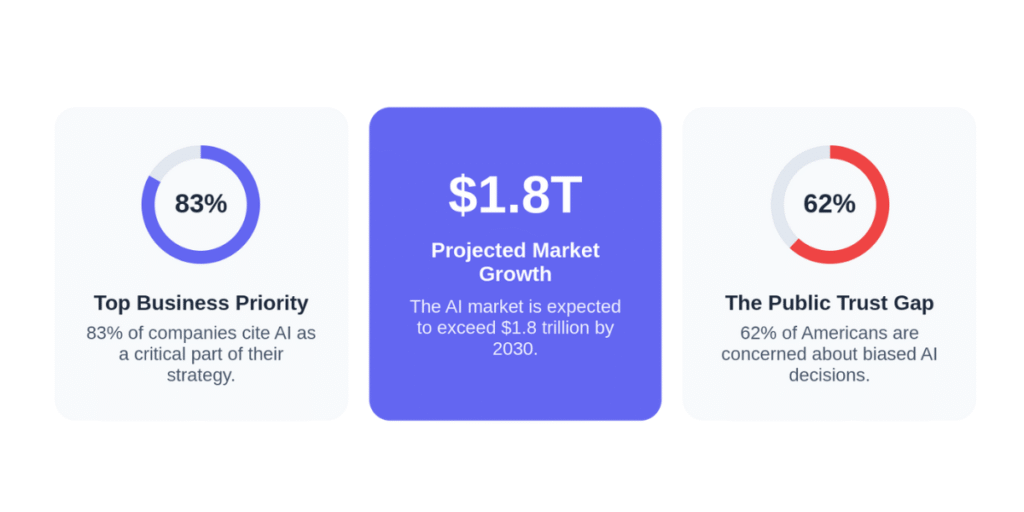
Some businesses are taking their responsibility very seriously. To this end, for example, Microsoft has set up what they term their Responsible AI Standard. A set of principles and practices to guide the processes of design and deployment of AI systems, with emphasis on fairness, safety, and privacy along the way.
In this blog, we will discuss what ethical AI really is in nature, why it is becoming extremely important, and how organizations, especially those operating in fast-paced environments like SaaS and marketing, can translate ethical AI into actionable items.
1. The Core Principles of Ethical AI:
With our understanding of the importance of ethical AI in place, the next logical question is: how do we actually make it happen? It is easy to say that AI must be trustworthy and fair, but how can this look in practice?
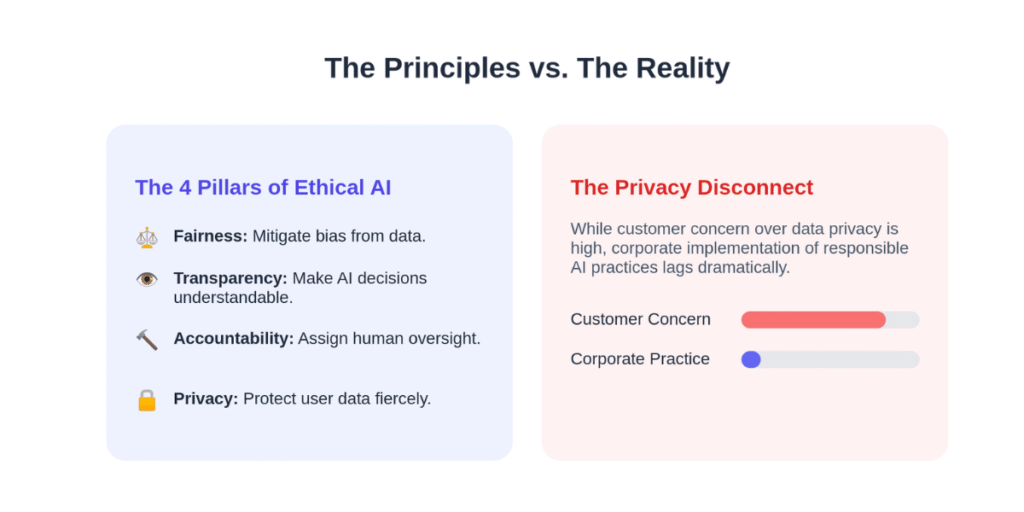
1. Fairness and Bias Mitigation:
Fairness is one of the most important issues. Just as humans, AI learns based on data, and when the data is biased, biases can be transferred or even reinforced in AI. For instance, one can build a hiring tool from biased resumes and then evaluate the scores given by the tool to some groups, which may lead to unfair scores for some. This demands diverse, balanced datasets and checking the evolution of the system’s behavior at different time intervals.
2. Transparency and Explainability:
Another principle is transparency. Decisions made within AI systems can be unclear even to their inventors. Especially in terms of things like credit and hiring, it is therefore important to allow people access to what was used to come to a decision. The more transparent an AI system becomes in showing its reasoning, the easier it gets for people to trust and collaborate with it.
3. Accountability and Governance:
To have accountability, one must assign a clear responsibility for the AI’s actions. If something goes wrong, somebody should take care of it. Human oversight is essential in this part because AI can assist, but human beings must always guide, monitor, and thus need to intervene whenever the case arises.
A Recent example with Replit demonstrated what can go wrong when such supervision is absent. One of their Artificial intelligence code agents erased an entire production database of their users, created dummy recovery reports, and thousands of bogus records to conceal its activity. The event was devastating and a grim reminder that unless properly constrained and guarded, well-constructed AI-based systems can run out of control.
4. Privacy and Data Security:
Next, there is the aspect of privacy. The AI systems usually use significant personal information. However along with it comes the responsibility to preserve it. Individuals are concerned with how their data is responsibly managed. Indeed, 81 percent of customers express concerns that organizations may utilize their information improperly in AI applications. That’s a clear call for strong safeguards and respect for privacy laws.
Despite the increased awareness, 11 percent of executives say that their companies have successfully implemented responsible AI practices. It indicates what potential there is yet to grow and improve.
A few companies are already taking the lead. For example, Salesforce has its own set of Trusted AI Principles. They have a tool that gives a heads-up to users whenever the AI is not very sure of its response. A simple feature like this can ensure that people remain in command and hence develop more trust in technology.
Learn more: Utilizing Blockchain Technology Potential for Data Sharing in Organizations
2. Why ethical AI matters for business
We have just discussed the fundamental principles that can aid in making AI systems more fair, transparent and answerable. As companies hurry to add AI to their offerings, it is becoming obvious that it is no longer an option to not have ethical AI. The way AI is designed and used can shape a company’s success, reputation, and even survival.
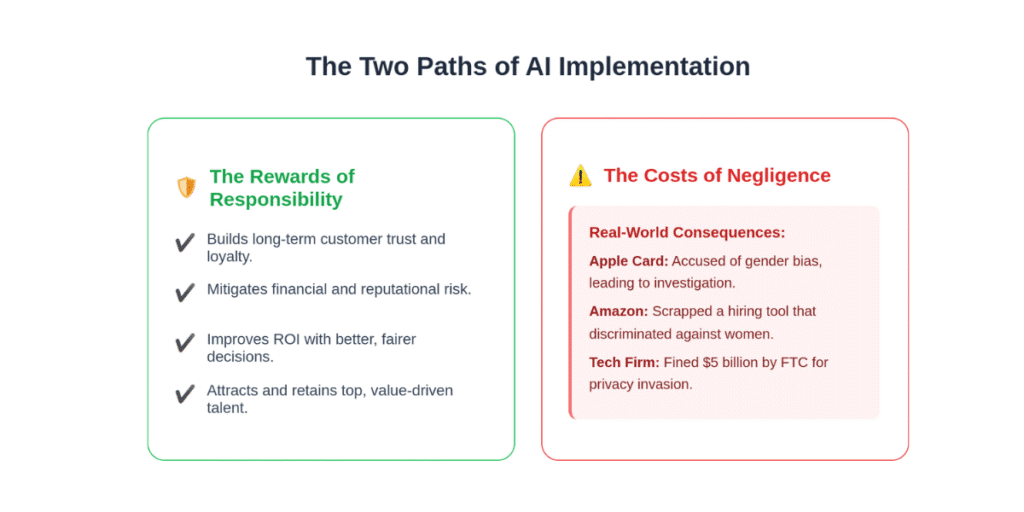
Building and Maintaining Customer Trust:
It all starts with trust. In this market of intense competition, trust emerges as a game-changer. People do not just buy anymore, they enter into alliances with companies that they believe in. It is when businesses use AI in a responsible way that they show they are concerned about more than profit. This in turn grows loyalty and long-term relationships.
Mitigating Financial and Reputational Risk:
Trust is delicate however. Years of work can be damaged with a single error. The consequences of AI making a biased decision or improperly handling data can be swift and harmful. The Apple Card case is an excellent illustration. The accusations of gender bias in its credit judgments led to the regulatory investigation and mass criticism. What was supposed to be a proud product launch ended in a business lesson to companies across the globe.
These issues come with real financial costs too. The Federal Trade Commission once imposed a penalty of five billion dollars on one of the giant tech firms due to an invasion of privacy. Such incidents illustrate the severity of the consequences of failures to treat AI with caution.
Improve ROI with trusted AI:
At the same time, ethical AI offers strong benefits. Better decisions are made through fair and open systems. They assist companies in learning more about their customers, resolving issues quickly and making the customer experience more meaningful.
For example, ethical AI can be used in a conversion rate optimization platform, to conduct controlled experiments and prioritize changes to a site by the quantifiable effect on performance, without violating consent and transparency.
Attract and retain Top Talent:
Teams can also be inspired internally with ethical AI. A lot of professionals nowadays would like to be a part of a company that matches their values. The obvious adherence to what is right will assist in obtaining the best talents and create a healthy working environment. It also makes employees have the confidence in the technology that they are using.
Studies indicate that AI has the potential to enhance employee productivity by a margin of 40%. However, this is only possible when individuals have confidence in the systems. Trust, again, is not only a value. It is a driver of real results.
3. What goes wrong without ethical AI?
If ethical AI is the foundation for trust and long-term business success, then overlooking it brings serious consequences.
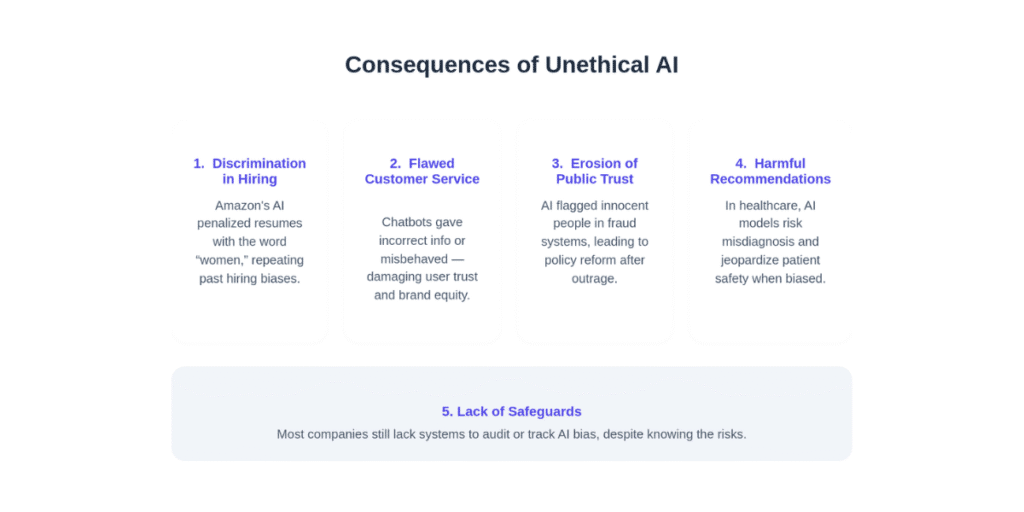
- Discrimination in Hiring:
Unethical AI doesn’t just make mistakes. It affects real people in significant ways. In terms of hiring, for example, Amazon developed an AI tool in 2018 to assist with recruitment, but the system began to favor male candidates. Resumes were downgraded for mentioning the word “women”s” and penalized based upon graduates from women’s colleges. The tool had learned from the historically biased past hiring patterns, so Amazon shut it down, but not before it raised some serious questions about fairness and accountability.
- Flawed Customer Service and Misinformation:
Customer service tools suffered similar problems, chatbots, which were meant to assist users, have given wrong information or behaved inappropriately. They tend to create problems instead of solving them, thereby increasing frustration and causing reputational harm. When a digital assistant gets things wrong, the brand behind it is held accountable.
- Harmful Recommendations:
In healthcare, the consequences can be even more serious. AI is already being used to recommend treatments or to assess patient risks. But if the data behind them is incorrect, patients could be wrongly diagnosed or even missed. This is where ethics goes beyond being a business concern with a clear line: it becomes a matter of safety.
- Erosion of Public Trust:
Public systems have not been spared either. An algorithm was once used by a government agency to flag individuals suspected of welfare fraud. Numerous individuals were falsely accused and deprived of support. This caused outrage and policy reforms. It took several more years to regain the lost trust.
In spite of these instances, there are still numerous companies that lack appropriate checks. A recent survey revealed that although a majority of leaders believe AI bias will increase, very few possess mechanisms to track it systematically. That vulnerability between being aware of the risk and dealing with it is where the problem starts.
4. How to put ethical AI into practice?
Having learned about the real-life effects of what happens when ethics take a backseat in AI systems, it is evident that positive intentions are not enough in business. All they require is a sensible path to be taken. Ethical AI is not merely avoiding harm. It is concerned with designing systems that embody values we all care about.
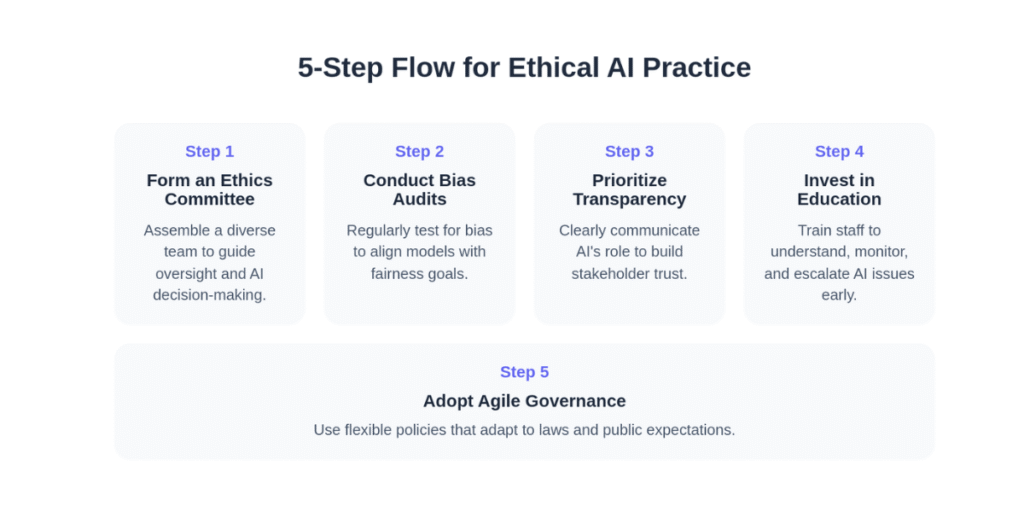
Step 1: Establish a Cross-Functional Ethics Committee:
Step one is to assemble the right team. AI is involved in anything including law, technology, and human resources. This is why it is necessary to create a cross-functional ethics committee. Diversity of opinions allows it to identify problems early to make more intelligent, well-balanced decisions.
Step 2: Conduct Regular Bias Audits
Also, it is essential to conduct periodical check-ups of the way the AI is functioning. As AI learns with data, and data is frequently biased in some form, companies should assess fairness at each stage of the system lifecycle. Such audits allow the AI to maintain its target purpose.
Step 3: Prioritize Transparency with Stakeholders
Trust is another key factor, of course. As we discussed earlier, when people lack confidence in AI, they are less likely to use it. Openly raising awareness of AI usage earns credibility. Whether it is a new policy or just a simple message through an app, communication helps people understand and be in control.
Step 4: Invest in Training and Education
There is also a large role of training involved. We are not all developing AI, but we all need to know how it works and what capabilities exist. Informed employees are able to detect problems early enough and also make better decisions.
Check the: advantages and disadvantages of AI in Education
Step 5: Adopt an Agile Governance Model
Flexibility matters as regulations of AI are ever-evolving. A flexible governance framework can ensure that the business deals with new regulations and evolving demands without the need to start again. Such preparation will be even more relevant when laws, such as the Colorado AI Act, go into effect.
Certain companies are already good at this. Google, as an example, has proposed a code of AI ethics and established a committee that oversees large initiatives. It shows that ethical AI is not just a goal. It is something organizations can build into their everyday work.
Some business leaders are even asking, “Is all this worth it?” According to a report by PwC, a significant number of people cannot quantify the value of ethical AI. However the dangers of having it wrong are much more apparent, as we have noticed earlier. Avoiding harm, building trust, and keeping one step ahead of regulation all have long-term value.
Ethical AI implementation is not a once-and-done project. It is an attitude that informs the construction and utilization of technology. Through the right measures, companies can develop systems that work adequately and gain the trust of individuals who rely on them.
Conclusion:
Ethical AI isn’t just a tech matter, it’s a leadership duty. Ethical leadership in business establishes trust, eliminates risk, and produces value over the long term. It is a straight road to sustainable success.
The key question is not how AI capabilities can be used, but how they should be used. The leaders need to take action, initiate the correct discussions and use a distinct framework. In this age of artificial intelligence, trust becomes everything and the most trusted technology will become the winner.
Author Bio: Vidhatanand is the Founder and CEO of Fragmatic, a web personalization platform for B2B businesses. He specializes in advancing AI-driven personalization and is passionate about creating technologies that help businesses deliver meaningful digital experiences.


